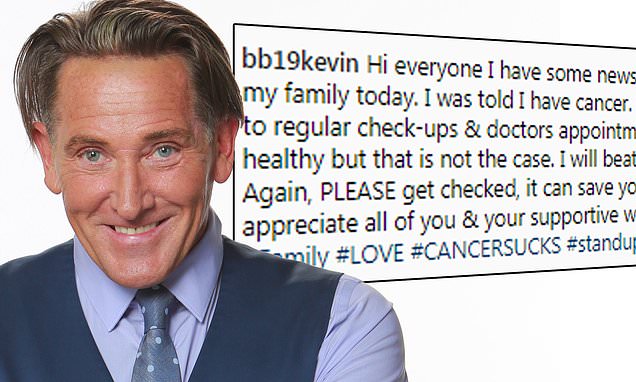Kevin Schlehuber is playing a tougher game than Big Brother now, as he announces he has been diagnosed with prostate cancer.
Schlehuber took to social media this week to reveal the diagnosis.
The 57-year-old from Boston, who placed fourth on season 19 of TV reality show, posted a photo of himself sitting alone in what appears to be a coffee shop and wrote: “Hi everyone I have some news to share with you. Last night I got a call & went to the doctor with my family today. I was told I have cancer.”
The father of seven said he is recovering from hearing the news.
‘I’m going to tell you that the first 48 hours were extremely difficult,” said Schlehuber. “I feel great, I exercise daily, but I was diagnosed with prostate cancer.”
In his message to fans, Schlehuber said: “I’m not posting this for sympathy but to raise awareness. Please go to regular check-ups & doctors appointments.”
He added: “I will beat this with the love & support from my family and close friends. Again, PLEASE get checked, it can save your life!”
He completed 86 days in the Big Brother House last year.
He was a fan favorite and in the running for America’s Favorite Houseguest but ultimately lost out to Cody Nickson.
Derrick Levasseur, a member of our Big Brother Mount Rushmore who won Big Brother 16 in 2014, offered kind words of support to Schlehuber.
“Stay strong brother! Keeping you and your family in my prayers,” he wrote alongside a praying hands emoji.
Stay strong brother! Keeping you and your family in my prayers! ??
— Derrick Levasseur (@DerrickL) October 23, 2018
Christmas Abbott, who cast the sole vote to evict Schlehuber so that she, Paul Abraham and Josh Martinez could go to the final three together, left a lengthy caption on his Instagram post.
Cancer accounts for 22.5 percent of all male deaths, making it the second leading cause of mortality for them, according to CDC data.
Prostate cancer is the second leading cause of cancer death in American men, behind lung cancer.
The vast majority of prostate cancer cases (more than 90 percent) are discovered in the early stages, making the tumors more likely to respond to treatment.

